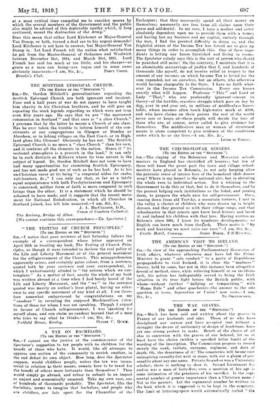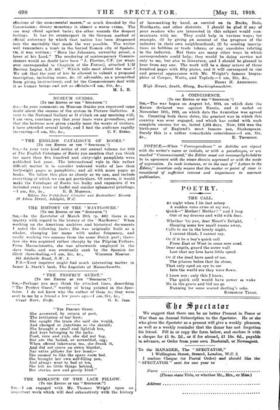THE WAR GRAVES.
(To THE EDITOR or THE " SPECTATOR.") Sia,—Much has been said and written about the graces is France of our husbands and sdns. Those of us who have disciplined our sorrow and have accepted (not without a struggle) the decree of uniformity of design of headstone, have yet one strong protest to make. Bereft of the choice of all else in connexion with the graves of our beloved, let us at least have the choice (within a specified letter limit) of the wording of the inscription. The Commission propose to record merely the rank, initials, surname, regiment, and date of death. Oh, the dreariness of it The cemeteries will be one vast uninspiring casualty-list writ in stone, with not a gleam of per- sonality about any one name. Private So-and-so was a University scholar; there is nothing to show it. Second Lieutenant So- and-so was a man of forty-five; even a mention of his age is some intimation of the greatness of his sacrifice. IR the regi- mental number of greater importance than a Christian name Not to the parents. Let the regimental number be written is the book which it is suggested is to be kept in the cemetery. The limit-of lettering-space would antornatically forbid " the
effusions of the monumental mason," so much dreaded by the Commiasion; dreary monotony is almost a worse crime. The one may offend against taste; the other wounds the deepest feelings. It has its counterpart in the German method of official autocracy by which that nation has been dragooned into the mentality that made the war possible. The writer well remembers a tomb in the buried Roman city of Spalato. On it was written: " Here lies Johannes, unworthy priest, a lover of his Lord." The rendering of contemporary Commis- sioners would no doubt have been " J. Flavius, CF. [or what- ever corresponded to Chaplain of the Forces], attached 1/12 Iberian Legion A.D. 458." Which tells most about the man We ask that the neat of kin be allowed to submit a proposed inscription, including name, he. (if advisable, on a prescribed form giving instructions), and let the Coramssioners deal with it as human beings and not as officiale.—I am, Sir, tic.,
IL L. H.



































 Previous page
Previous page